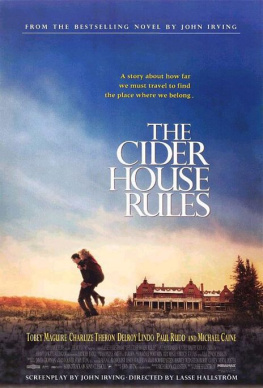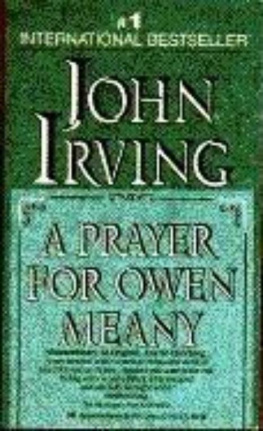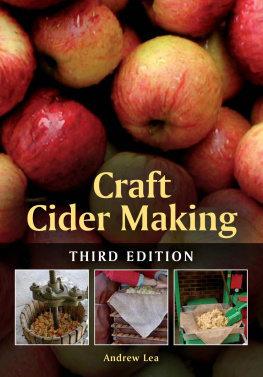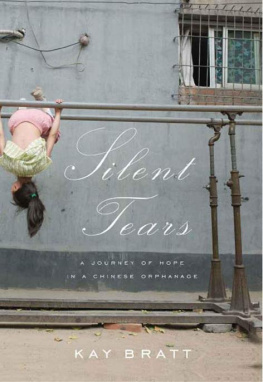
John Irving
The Cider House Rules
Conventionality is not morality. Self-righteousness is not religion. To attack the first is not to assail the last.
Charlotte Bronte, 1847
For practical purposes abortion may be defined as the interruption of gestation before viability of the child.
H.J. Boldt, M.D., 1906
1. The Boy Who Belonged to St. Cloud's
In the hospital of the orphanage-the boys' division at St. Cloud's, Maine-two nurses were in charge of naming the new babies and checking that their little penises were healing from the obligatory circumcision. In those days (in 192-), all boys born at St. Cloud's were circumcised because the orphanage physician had experienced some difficulty in treating uncircumcised soldiers, for this and for that, in World War I. The doctor, who was also the director of the boys' division, was not a religious man; circumcision was not a rite with him-it was a strictly medical act, performed for hygienic reasons. His name was Wilbur Larch, which, except for the scent of ether that always accompanied him, reminded one of the nurses of the tough, durable wood of the coniferous tree of that name. She hated, however, the ridiculous name of Wilbur, and took offense at the silliness of combining a word like Wilbur with something as substantial as a tree.
The other nurse imagined herself to be in love with Dr. Larch, and when it was her turn to name a baby, she frequently named him John Larch, or John Wilbur (her father's name was John), or Wilbur Walsh (her mother's maiden name had been Walsh). Despite her love for Dr. Larch, she could not imagine Larch as anything but a last name-and when she thought of him, she did not think of trees at all. For its flexibility as a first or as a last name, she loved the name of Wilbur-and when she tired of her use of John, or was criticized by her colleague {13} for overusing it, she could rarely come up with anything more original than a Robert Larch or a Jack Wilbur (she seemed not to know that Jack was often a nickname for John).
If he had been named by this dull, love-struck nurse, he probably would have been a Larch or a Wilbur of one kind or another; and a John, a Jack, or a Robert-to make matters even duller. Because it was the other nurse's turn, he was named Homer Wells.
The other nurse's father was in the business of drilling wells, which was hard, harrowing, honest, precise work -to her thinking her father was composed of these qualities, which lent the word 'wells' a certain deep, downto-earth aura. 'Homer' had been the name of one of her family's umpteen cats.
This other nurse-Nurse Angela, to almost everyone- rarely repeated the names of her babies, whereas poor Nurse Edna had named three John Wilbur Juniors, and two John Larch the Thirds. Nurse Angela knew an inexhaustible number of no-nonsense nouns, which she diligently employed as last names-Maple, Fields, Stone, Hill, Knot, Day, Waters (to list a few)-and a slightly less impressive list of first names borrowed from a family history of many dead but cherished pets (Felix, Fuzzy, Smoky, Sam, Snowy, Joe, Curly, Ed and so forth).
For most of the orphans, of course, these nurse-given names were temporary. The boys' division had a better record than the girls' division at placing the orphans in homes when they were babies, too young ever to know the names their good nurses had given them; most of the orphans wouldn't even remember Nurse Angela or Nurse Edna, the first women in the world to fuss over them. Dr. Larch made it a firm policy that the orphans' adoptive families not be informed of the names the nurses gave with such zeal. The feeling at St. Cloud's was that a child, upon leaving the orphanage, should know the thrill of a fresh start-but (especially with the boys who {14} were difficult to place and lived at St. Cloud's the longest) it was hard for Nurse Angela and Nurse Edna, and even for Dr. Larch, not to think of their John Wilburs and John Larches (their Felix Hills, Curly Maples, Joe Knots, Smoky Waterses) as possessing their nurse-given names forever.
The reason Homer Wells kept his name was that he came back to St. Cloud's so many times, after so many failed foster homes, that the orphanage was forced to acknowledge Homer's intention to make St. Cloud's his home. It was not easy for anyone to accept, but Nurse Angela and Nurse Edna-and, finally, Dr. Wilbur Larch-were forced to admit that Homer Wells belonged to St. Cloud's. The determined boy was not put up for adoption anymore.
Nurse Angela, with her love of cats and orphans, once remarked of Homer Wells that the boy must adore the name she gave him because he fought so hard not to lose it.
St. Cloud's, Maine-the town-had been a logging camp for most of the nineteenth century. The camp, and-gradually-the town, set up shop in the river valley, where the land was flat, which made the first roads easier to build and the heavy equipment easier to transport. The first building was a saw mill. The first settlers were French Canadians-woodsmen, lumberjacks, sawyers; then caime the overland haulers and the river bargemen, then the prostitutes, then the vagrants and the thugs, and (at last) there was a church. The first logging camp had been called, simply, Clouds- because the valley was low and the clouds broke up reluctantly. A fog hung over the violent river until midmorning, and the falls, which roared for three miles upstream from the site of the first camp, produced a constant mist. When the first woodcutters went to work there, the only impediments to their rape of the forest were the black flies and the mosquitoes; these infernal {15} insects preferred the nearly constant cover of clouds in the stagnant valleys of inland Maine to the sharp air of the mountains, or to the crisp sunlight by the bright Maine sea.
Dr. Wilbur Larch-who was not only the doctor for the orphanage and the director of the boys' division (he had also founded the place)-was the self-appointed historian of the town. According to Dr. Larch, the logging camp called Clouds became St. Clouds only because of 'the fervent backwoods Catholic instinct to put a Saint before so many things-as if to grant those things a grace they could never quite acquire naturally.' The logging camp remained St. Clouds for nearly half a century before the apostrophe was inserted-probably by someone who was unaware of the camp's origin. But by the time it became St. Cloud's, it was more of a mill town than a logging camp. The forest, for miles around, was cleared; instead of logs jamming the river, and the rough camp full of men lamed and crippled by falling from trees or by trees falling on them, one saw the high, orderly stacks of fresh-cut boards drying out in the hazy sun. Overall lay a silty sawdust occasionally too fine to see, but ever-present in the sneezes and wheezes of the town, in the town's perpetually itching noses and in its rasping lungs. The town's wounded now sported stitches instead of bruises and broken bones; they wore gashes (and found ways to flaunt their missing parts) from the mill's many saws. The keen whine of those blades was as constant in St. Cloud's as the fog, the mist, the humidity that overhangs inland Maine in the damp cold of its long, wet, snowed-in winters and in the fetid, stifling heat of its drizzly summers-blessed, only occasionally, by violent thunderstorms.
There was never any spring in that part of Maine, except that period of time in March and April distinguished by thawing mud. The heavy equipment of the lumbering business was immobilized; the work of the town shut down. The impassable roads kept everyone at {16} home-and the springtime river was so swollen, and ran so fast, that no one dared to travel on it. Spring in St. Cloud's meant trouble: drinking trouble, brawling trouble, whoring and raping trouble. Spring was the suicide season. In spring, the seeds for an orphanage were planted and overplanted.
Next page
















